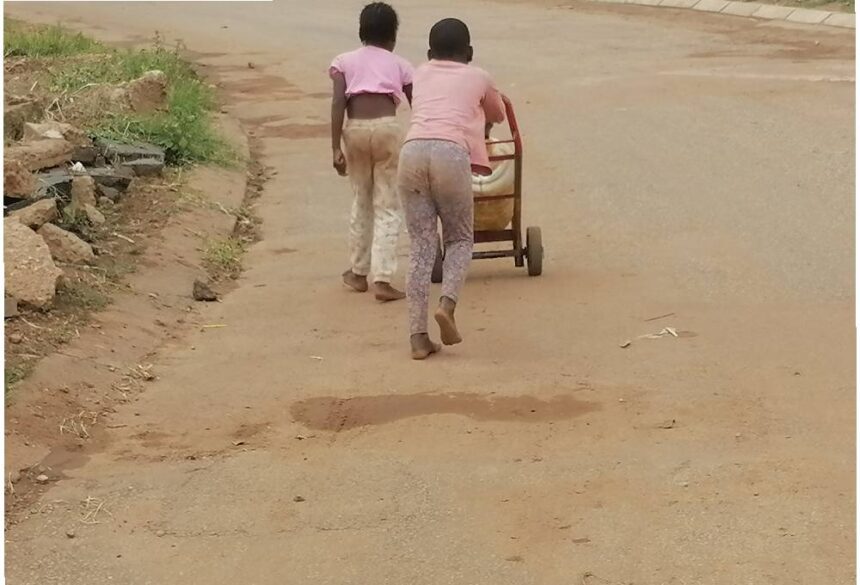The water crisis in Tshikota township, located in the Makhado municipality, continues to worsen, with residents, mainly women and children, facing daily struggles to access clean water. The situation has become so dire that residents are forced to buy water from borehole owners or water vendors, while others rely on solar-driven boreholes for their water needs.
Thabang Tlou, the secretary of the South African National Civic Organisation, explains that the water challenges in Tshikota began a decade ago when the water authority was handed over to the Vhembe District Municipality. Since then, residents have been experiencing frequent water shortages, with pipe bursts taking weeks to be repaired, leaving the community without water for extended periods.
Despite efforts to address the issue, such as the donation of three boreholes to the community in 2020 and a borehole donation from Wearne mine in November 2023, residents still face unreliable water access. Ward councillor Dimakatso Sebola has even reached out to the municipality and the mine for assistance, but the situation remains unresolved.
The burden of the water crisis falls heavily on women in the community, who are often seen pushing wheelbarrows filled with water containers for long distances. One resident, 71-year-old Lilian Chihwindi, has to hire someone to fetch water for her, as she can no longer push a wheelbarrow herself. She pays R10 per trip, with each trip consisting of four 25-liter containers of water.
The water challenges in Tshikota are not unique, as neighboring areas such as Louis Trichardt town and other rural villages in the Kutama Sinthumule area also face water shortages. Some residents have taken matters into their own hands by drilling boreholes themselves, rather than waiting for the municipality to address the issue.
Dr. Ferrial Adam, executive manager at Water Community Action Network (WaterCAN), attributes the lack of consistent water supply to neglect of rural areas, corruption, and mismanagement. She points to the ongoing Giyani Water Project, which started in 2014 and is yet to be completed, as an example of unfulfilled promises and lack of accountability.
Adam emphasizes the need for urgent action to ensure all Limpopo residents have access to clean water, as relying on contaminated rivers and streams poses serious health risks. She calls for those responsible for the mismanagement of water infrastructure projects to be held accountable and for tangible solutions to be implemented to address the ongoing water crisis in the region.
Despite efforts to engage with the Vhembe District Municipality, the lack of response to media inquiries indicates a concerning lack of transparency and accountability in addressing the water challenges faced by communities like Tshikota. As residents continue to struggle to meet their basic water needs, urgent action is needed to ensure access to clean and reliable water for all. The world is changing at a rapid pace, and with it, our understanding of what it means to be human is evolving. Advances in technology, science, and medicine are pushing the boundaries of what was once thought possible, and the implications for our future are profound.
One area where this is particularly evident is in the field of artificial intelligence. AI has the potential to revolutionize nearly every aspect of our lives, from how we work and communicate to how we think about ourselves and our place in the world. But as AI becomes increasingly integrated into our daily lives, questions about its impact on our humanity are becoming more urgent.
Some argue that AI has the potential to enhance our humanity by freeing us from mundane tasks and allowing us to focus on more creative and meaningful pursuits. For example, AI-powered robots and algorithms can perform repetitive tasks more efficiently than humans, freeing up time for us to engage in more fulfilling activities. AI can also help us make better decisions by processing vast amounts of data and identifying patterns that humans might miss.
On the other hand, there are concerns that AI could erode our sense of agency and autonomy. As AI systems become more sophisticated, there is the potential for them to make decisions on our behalf, without our input or consent. This raises questions about who is ultimately responsible for the decisions made by AI systems, and whether we are comfortable ceding control to machines.
There are also concerns about the potential for AI to exacerbate inequality and social injustice. As AI systems become more prevalent in areas like hiring, healthcare, and criminal justice, there is the risk that biases and prejudices embedded in these systems could perpetuate existing inequalities. For example, if AI algorithms are trained on biased data, they may perpetuate discriminatory practices that disadvantage certain groups.
Despite these challenges, there is also the potential for AI to help us better understand what it means to be human. By creating machines that can mimic human cognition and behavior, we may gain new insights into our own minds and bodies. AI could also help us develop more compassionate and empathetic systems that better reflect our values and aspirations.
Ultimately, the impact of AI on our humanity will depend on how we choose to use this technology. By approaching AI with a critical and ethical mindset, we can harness its potential to enhance our humanity and create a more just and equitable society. It is up to us to shape the future of AI in a way that reflects our shared values and aspirations for a better world.








